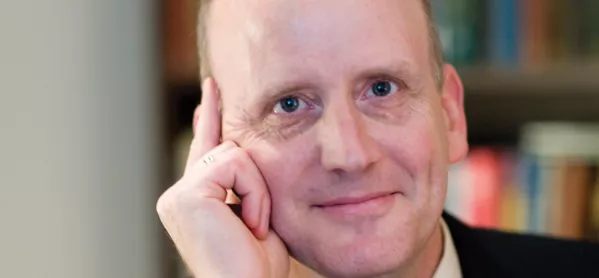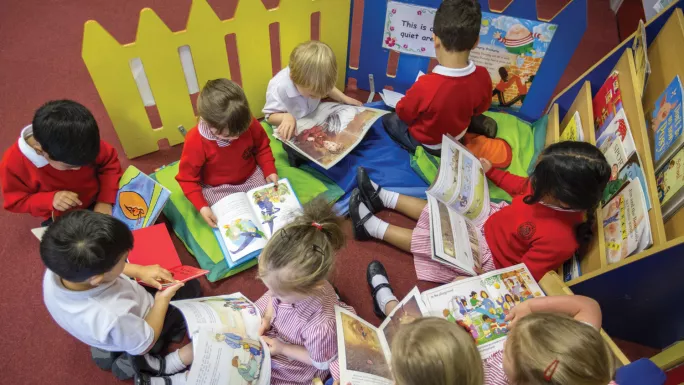
- Home
- TES talks to...Daniel Willingham
TES talks to...Daniel Willingham

A few months back, Professor Daniel Willingham posted a doctored photo on Twitter of Usain Bolt winning the 100m at the Olympics. Bolt - way out in front, of course - was labelled “Learning Styles Theories” and each of the chasing pack as one of the academics trying furiously to communicate the complete lack of basis for the learning styles theory (see the image here).
It was telling in many ways. Firstly, Willingham was happy to be placed at the back when he is among the most high-profile critics of learning styles. Secondly, it was a knowing wink to the fact that, despite a very broad contribution to education theory, learning styles is what he is most associated with (and almost always the reason he is dragged into Twitter debates on education). Lastly, it suggested that he and the other academics were failing in their bid to catch up with the learning styles bandwagon when, actually, he and they have done enough to discredit the theory to at least warrant a photo finish.
Mostly, it shows that Willingham is a humble man. Unlike some academics, he doesn’t make grand proclamations, he doesn’t tell teachers what to do and you will never see him heading up pricey conferences rinsing teachers of hard-earned cash with promises to solve all their problems.
Inspiration for teachers
He could do all that if he wanted to. His book Why Don’t Students Like School? was a bestseller and is one of the most quoted texts in education. His other books - which include Raising Kids Who Read - are must-reads on university courses, and his columns, articles and studies are widely shared and applauded. But he’d rather not do all that, because he says that what he does and what teachers do is very different.
“There are important differences between the types of work that are useful to researchers and the types of work that are useful to practitioners,” he explains. “My field has not done a terrific job of keeping that distinction at the forefront of their mind when they communicate with teachers.”
What Willingham is interested in doing is providing information for teachers about what goes on in the brain and then letting them use that as a basis to explore theories of instruction.
‘I’m trying to provide a way of thinking about learning to read. I want to offer a very simple but useful model’
With each book, it could be argued, he has honed that mission and with his next book, which is due out in April 2017, he thinks he has something that will accurately match his objectives.
The book is to be called The Reading Mind: a cognitive approach to understanding how the mind reads and he hopes it will have as much impact as Why Don’t Students Like School?
“One of the things I concluded would be useful for teachers is for them to have a bit of a cartoon in their head about the basic mechanics of how kids learn different things they encounter in school,” says Willingham.
“In Why Don’t Students Like School?, I presented such a cartoon and built it up across chapters, looking at working memory, long-term memory and attention. It was a very stripped-down version of how the mind works. What I decided was that it would be useful for teachers to have a similar model of the processes that contribute to reading.”
The book explains how most - and he emphasises this word - children learn to read in the same way. There are three components to decoding: differentiating letters, which is “pretty tricky but most children don’t have much trouble despite common mistakes with things like a b and d or the like”; hearing individual speech sounds, which is the thing that can “really give children trouble”; and mapping, so knowing the sound that goes with the symbol.
“The second part is the trickiest bit,” says Willingham. “I go into the reasons why this is in a lot of detail in the book. But interestingly, when kids do have trouble hearing speech sounds, there is pretty good research that suggests if they have strong linguistic ability that comes from a home environment rich in language and vocabulary, they come into pre-school knowing what the game of reading is all about, and that provides a lot of support. If they do not have that background, their inability to hear individual speech sounds is going to give them a whole lot more trouble. Why that is, is still a bit of a mystery.”
He argues that, though teachers are well aware of the different processes in reading, their focus when a child struggles is always on what they should do next, not necessarily on what is going on in the brain at that moment. The aim of the new book is to give the teacher that insight.

Demystifying the process
“Reading is a topic of the most concern to most people and so it made sense to me to try and demystify the process,” he says. “I want to provide a very simple but useful model that ties together a lot of the phenomena teachers see in the classroom and helps them make sense of what they see.
“Teachers do recognise there are these three stages to reading. Most realise it is not a black box. But the analysis is mainly, ‘What do we do next?’, which is obviously what they should be doing. But when teachers have been looking through this book for me, what they say is that they suddenly remember why this happens, rather than just what to do about it.
“What I am trying to provide is a way of thinking about learning to read. I am not providing a template to help, I am looking at what a successful reader does - what is happening in their mind - and presenting the research on that, so teachers can have a better idea about what is happening, when and how.”
While Willingham states that most children will learn to read the same way, that doesn’t mean he believes every child is the same when it comes to reading. He is clear that there are multiple factors at work, determining how well a child will read.
“One key factor is what researchers call ‘self-efficacy’, the belief in how good a reader you are. The reader may question, ‘What am I going to get out of reading this book?’ and, ‘Do I think I am going to be successful at reading it?’
“There is also a self-concept as a reader. I might see myself as someone who reads well, but not as a ‘reader’. It is not something I choose to do. I know many people like that - they enjoy reading but they do not seek it out. If they are going on a long flight, they do not take a book - they do not even think about it.“Both of these things are big determinants of how well children read because they will determine how much a child will read. And how much a child reads does affect how good a reader you are.
“So do kids learn reading the same way? Yes, they all have to go through the process, but they can struggle with those different stages and to different degrees, and that is why you see a lot of variability.”
‘I’m looking at what a successful reader does - what is happening in their mind’
He’s clear that what his book is not going to do is tell you how to solve these problems. He’ll show you all the various elements of the door to successful reading but he says that teachers are the best equipped to know how to open it.
“The theory for reading is not a theory of instruction,” he says. “It will probably constrain the theory of instruction a little bit - you can make accurate guesses if you know the theory of reading, what the processes are, what is likely to contribute to that process or not. [But] there is very little pedagogy in the book at all.”
Why bother reading it, you might think? In a time-poor world, people often find they have little chance to think, and so prescriptive books are appealing as they promise an easy solution.
Well, you should consider reading it because promises are often broken when it comes to education books proclaiming definitive answers. You should also consider reading it because what Willingham is offering may not be “answers”, but something better: empowerment and the tools to make your own mind up in an informed way.
Not that he would put it that way himself, of course. As mentioned earlier, he is a humble man - and, it turns out, a poor salesman.
“When do you trust the experts? The relationship between basic scientific theory and practice is difficult,” he says.
It’s less difficult, though, if you are up-front with what you are trying to do and realistic about the practical potential. In these terms, Willingham is a lot closer to being the Bolt of education research than he might think.
Jon Severs is commissioning editor of TES. He tweets at @jon_severs
Register with Tes and you can read five free articles every month, plus you'll have access to our range of award-winning newsletters.
Keep reading for just £4.90 per month
You've reached your limit of free articles this month. Subscribe for £4.90 per month for three months and get:
- Unlimited access to all Tes magazine content
- Exclusive subscriber-only stories
- Award-winning email newsletters
You've reached your limit of free articles this month. Subscribe for £4.90 per month for three months and get:
- Unlimited access to all Tes magazine content
- Exclusive subscriber-only stories
- Award-winning email newsletters